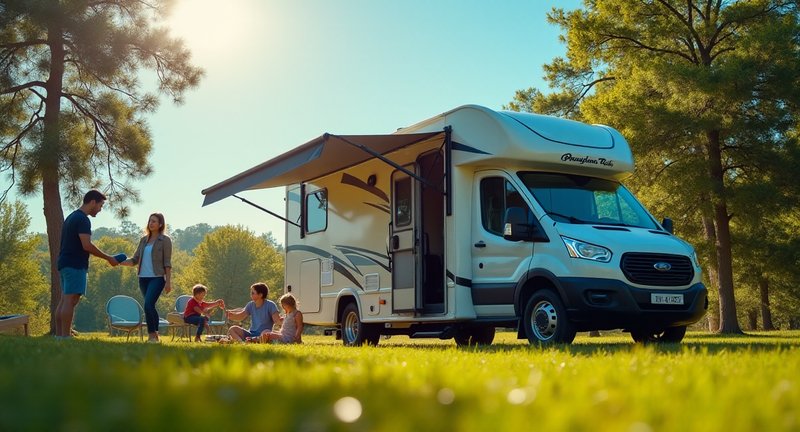Top 5 RV Extended Warranty Companies
Considering hitting the open road in an RV, there’s nothing quite like the sense of freedom. But that freedom can come with a few unexpected surprises. I’ve been there – stranded at a roadside gas station, waiting on repairs that cost way more than I expected. That’s why I always recommend knowing who the top players are when it comes to the .
Finding the right coverage can feel like navigating a maze. Each warranty provider has its own set of rules, but let’s be real – the peace of mind you get is worth every penny. The give you that cushion when your home-on-wheels throws a curveball.
What you want to look for is more than just a fancy name or a cheap plan. It’s about reliable service when things break down in the middle of nowhere. Trust me, when you’re 100 miles from the nearest town, you’ll be thankful you chose wisely from the .

Whether you’re a full-time road warrior or just hitting the pavement for summer trips, a good extended warranty can make all the difference. The companies I’m talking about don’t just offer coverage – they offer a safety net for your adventure.
So, take my advice: do your homework, compare the , and get back to focusing on the views, not the vehicle.
Understanding Top 5 RV Extended Warranty Companies
Let’s dive into a topic that can save your travels from turning into a nightmare – RV extended warranties. I’ve been on the road enough to know that while the open highways are full of adventure, unexpected repairs can hit you like a brick wall. Choosing the right coverage is essential, but with so many options out there, where do you begin? Let me walk you through some key players in the market, so you can keep cruising, worry-free.

When you’re considering an RV extended warranty, here’s what I look for:
-
Coverage variety: Not all companies offer the same scope of protection. Some might cover powertrains and engines, but leave out crucial components like the air conditioning. I always check that they offer what I need, not just what’s cheapest.
-
Customer service: You’ll want a company that treats you like a person, not a number. Quick responses and 24/7 availability matter when you’re in the middle of nowhere and your engine decides to take a vacation.
-
Flexibility with repair shops: Some warranties limit you to specific service centers. The best ones let you go to any licensed mechanic, whether you’re in a big city or a small town off the beaten path.
-
Claim limits and deductibles: It’s tempting to go with the lowest deductible, but be careful. Often, that means higher premiums. Balance is key, and it’s worth comparing.
-
Transferability and cancellation: Life on the road changes. Maybe you’ll sell your RV one day. Companies that let you transfer the warranty to a new owner or cancel it with little hassle make life simpler.
Remember, finding the right extended warranty is all about peace of mind. I’ve been through enough breakdowns to know it’s not a matter of “if” but “when.”
Introduction to RV Extended Warranties
When I first ventured into the world of RVs, I quickly learned that owning one isn’t just about the freedom of the open road it also comes with its share of responsibilities. One of those responsibilities, which often catches new owners off guard, is figuring out how to protect your investment for the long haul. This is where extended warranties come in, and let me tell you, it’s a game-changer for your peace of mind.
An extended warranty for your RV, often called a service contract, goes beyond the basic manufacturer’s warranty. Once that original coverage expires, you’re on your own with repairs unless, of course, you’ve got extended protection. These warranties cover costly repairs to your RV’s essential components, from the engine to the electrical system, so you’re not paying out of pocket for every hiccup.
But before you jump into purchasing one, consider these key points:
-
Know what’s covered: Not all warranties are created equal. Some cover everything from the wheels up, while others might just handle the major systems like the engine or transmission. Always double-check the fine print.
-
Transferability: If you decide to sell your RV, some extended warranties are transferable to the new owner. This can be a nice little bonus when it comes time to make a sale.
-
Roadside Assistance: Some warranties come bundled with extras, like towing or emergency services. It’s a good idea to opt for these add-ons because who wants to be stuck in the middle of nowhere?
An RV extended warranty isn’t just about protecting your wallet. It’s about protecting your travel dreams and ensuring you spend more time on the road than in the repair shop.
Why You Need an Extended Warranty for Your RV
Let me tell you why getting an extended warranty for your RV isn’t just a nice-to-have it’s essential. Imagine this: you’re cruising down the open road, feeling the freedom of the highway beneath your tires, and then, suddenly, the air conditioning fails or the transmission starts acting up. It happens, and trust me, these things can cost you thousands. That’s where an extended warranty comes in.
First of all, RVs are complex machines. They’re not just vehicles; they’re homes on wheels, with all the accompanying systems plumbing, electrical, HVAC, appliances, and more. An extended warranty covers these essentials and prevents you from being hit with an unexpected repair bill.
Here are a few solid reasons you should consider it:
- Peace of mind: Knowing you’re covered means you can focus on the adventure, not the what-ifs.
- Saves you money: While there’s an upfront cost, the long-term savings are real, especially if you end up needing major repairs.
- Covers more than just the engine: Many plans include things like appliances, electronics, and even roadside assistance.
- Increased resale value: A transferable warranty can make your RV more appealing to buyers when it’s time to upgrade.
But here’s the kicker it’s not just about the breakdowns. Having an extended warranty lets you enjoy your travels without the constant worry of something going wrong and wrecking your budget. I’ve been there. Whether it’s the fridge going on the fritz or the generator giving up mid-trip, knowing I had coverage made all the difference in those stressful moments.
Take it from someone who has learned the hard way: invest in an extended warranty. Your future self (and your wallet) will thank you.
Key Features to Look for in RV Warranty Providers
When shopping for RV warranties, you’re not just buying a safety net you’re investing in peace of mind. From my own road trips, I’ve learned that knowing what sets a reliable provider apart makes all the difference.
One of the first things I look at is coverage options. A good warranty isn’t one-size-fits-all. I want the flexibility to choose protection that suits my specific needs whether it’s engine breakdown or those smaller, irritating electrical issues that always seem to pop up.
Next, pay close attention to the claim process. The best providers make it easy, not a paperwork nightmare. I once dealt with a company that took weeks just to process a minor repair it completely disrupted my trip. Speed and simplicity in handling claims can save your adventure from going off the rails.
Don’t overlook the provider’s reputation. Take time to dig through reviews or even ask fellow RVers for their experiences. There’s something reassuring about knowing other travelers have tested the waters with a company and come out satisfied.
Another key feature is transferable warranties. If you ever decide to sell your RV, having a warranty that transfers to the new owner boosts its value. I didn’t think much about this until it came time to sell my first RV it turned out to be a great bargaining chip.
Also, think about extra perks. Some companies offer roadside assistance or discounts on maintenance services. Those little bonuses can really add up when you’re on the road for weeks or months at a time.
Factors to Consider When Choosing an RV Warranty
When picking out an RV warranty, it’s not all about what looks good on paper. You’ve got to think about where your travels will take you. If you’re someone who hits remote, rugged spots, you’ll want a plan that covers the kind of repairs you may need out in the wilderness. Trust me, nothing dampens the freedom of the open road like a surprise repair bill you didn’t plan for.
Another thing to consider is how long you plan to hold on to your RV. If this is your home-on-wheels for years to come, you’ll need a warranty that goes the distance. Some warranties might leave you hanging just when things start getting expensive. Look for one that’s got your back for as long as you’re driving it.
Check out whether the warranty lets you choose where to get your repairs done. Some will limit you to specific shops, while others give you freedom to choose. Believe me, when you’re out in a small town in the middle of nowhere, you’ll want the flexibility to head to the nearest mechanic instead of chasing down a ‘preferred’ one that’s hours away.
Then there’s the nitty-gritty read the fine print. Some warranties are packed with exclusions, covering everything but what’s likely to break. I’ve seen folks get blindsided by repairs they thought were covered, only to find out they’re on their own. Don’t let that happen to you. Get clear on what’s covered and what’s not before you sign anything.
Comparing the Best RV Warranty Options on the Market
Considering RV warranties, it feels like you’re navigating through a sea of options, each claiming to be the ultimate safety net. I’ve been down that road, and trust me, not all warranties are created equal. It’s worth taking the time to look beyond the fine print and understand what each company really offers.
Some plans cover a wide range of repairs, while others might leave you hanging on major breakdowns. You’d think all “comprehensive” plans would cover essentials, but I’ve learned the hard way that’s not always the case. I always recommend checking if things like the transmission or electrical systems are included these can be huge expenses if they go wrong.
Now, let’s talk about exclusions. It can be a real headache when you find out that your coverage doesn’t extend to what you assumed was a given. No one likes surprises like a “wear and tear” clause that somehow seems to exclude most of your RV’s most-used parts. This is why I’m all for warranties that spell things out in plain language, no sneaky clauses.
In my experience, customer service makes or breaks the deal. You can have the best plan on paper, but if the company drags its feet on repairs or makes claims a hassle, what’s the point? I always lean towards companies that make the process smooth and efficient, and I’d encourage you to do the same. After all, peace of mind on the road shouldn’t come with strings attached.
RV Warranty Coverage: What’s Included and What’s Not
Considering RV warranty coverage, it’s like packing your bags for a long trip you need to know exactly what you’re bringing along and what’s left behind. Based on my own experience, an RV warranty will typically cover a variety of mechanical and electrical components, but there are often a few surprises hidden in the fine print. Let’s dig into what you can expect from your RV warranty and, more importantly, what you won’t.
What’s usually covered:
- Powertrain systems: This typically includes the engine, transmission, and drivetrain. Basically, if your RV decides to stall in the middle of nowhere, you’re covered for those big-ticket mechanical failures.
- Electrical systems: Think about your A/C, fridge, and microwave. Those vital, comfort-enhancing systems should be protected, meaning you won’t be paying out of pocket if they give out.
- Slide-outs and levelers: Most standard warranties will take care of these. You know, the little things that make your RV feel more like home when you park in paradise.
What’s often left out:
- Wear and tear items: Tires, brake pads, and batteries they age just like the rest of us, and unfortunately, these aren’t typically included in the coverage. Be prepared to handle these expenses on your own.
- Cosmetic issues: Scratches, dings, or faded paint? Don’t expect your warranty to foot the bill for cosmetic imperfections. They’re part of the road-trip charm, right?
- Aftermarket parts: If you’re the kind of person who likes to add custom features, those extras might not fall under your standard warranty. It’s good to ask before you install that fancy solar panel or new sound system.
In short, RV warranties cover the heart and soul of your rig, but leave out many of the smaller, everyday expenses. Knowing the difference can save you a lot of frustration down the road trust me, I’ve been there.
Understanding the Different Types of RV Warranties
When you’re buying an RV, one thing that often gets lost in the excitement is the warranty. I learned that the hard way. There are different types of RV warranties, and not all of them are created equal. Each one has its own fine print, and it’s worth diving into before you hit the road.
First, there’s the manufacturer’s warranty, which usually covers your RV for a certain number of years or miles. This is your safety net for anything that goes wrong early on, but it won’t last forever. It’s important to understand the limitations of this coverage.
Then there are extended warranties, often called service contracts. These pick up where the manufacturer’s warranty leaves off, helping cover unexpected repairs. I’ve found that these can be a lifesaver, but they also vary a lot depending on the provider. So, it’s crucial to compare and read the terms carefully.
Some warranties focus on the chassis or engine, while others cover appliances and interior components. If you’re like me and love cooking in the RV, you’ll want to pay attention to warranties that cover kitchen gear. These little details make all the difference when something breaks down in the middle of nowhere.
Also, there are specialized warranties for things like tires or glass. If you travel off the beaten path, these are worth considering. In the end, it all comes down to knowing what you need based on how you plan to use your RV. The best advice I can give? Take your time, do your research, and think ahead about what could go wrong.
A Journey Through Top 5 RV Extended Warranty Companies
When I first ventured into the world of RV ownership, the thrill was palpable. However, the looming question of maintenance costs soon crept in, leading me to explore the Top 5 RV Extended Warranty Companies. Trust me, this journey is as crucial as choosing your dream RV.
The vast landscape of extended warranties can feel overwhelming. Some companies offer extensive coverage, while others can leave you stranded figuratively speaking, of course. My experience taught me that understanding the fine print is essential. After all, who wants to deal with surprises on the road?
I vividly recall sitting down with a cup of coffee, ready to decipher the warranties. The difference between plans can be striking. Some providers cover everything, while others may skimp on essential components. It’s like comparing apples to oranges; the nuances matter.

One aspect that truly stood out to me was the customer service experience. You want a company that’s not only reputable but also genuinely cares about your needs. I found that the companies that prioritize communication and responsiveness often rank among the Leading rv extended warranty providers.
So, if you’re on the brink of making a decision, take the plunge! Your future road trips deserve the protection and peace of mind that come from the right warranty. The road ahead is waiting, and it’s much more enjoyable when you know you’re covered.
How to Choose the Right RV Warranty for Your Needs
Choosing the right RV warranty can feel like navigating a labyrinth of options, but it doesn’t have to be daunting. I remember when I first faced this decision; it was like standing at a crossroads with a multitude of paths, each promising something different. Here’s how I approached it, and hopefully, my insights will guide you through your own decision-making process.
1. Understand Your RV Usage
Think about how often you hit the open road. Are you a weekend warrior or a full-time traveler? The intensity of your RV use can influence the type of coverage you need.
2. Identify Coverage Options
Not all warranties are created equal. Here are the primary types to consider:
- Comprehensive Coverage: Covers almost everything, giving you peace of mind.
- Powertrain Coverage: Focuses on the engine and transmission, great if you’re not too worried about the interior.
- Basic Coverage: A more economical option, but be aware of the limitations.
3. Read the Fine Print
I can’t stress this enough. Don’t let the glittery promises of comprehensive plans blind you. Always read the terms and conditions. Look out for:
- Deductibles: What will you pay out of pocket?
- Exclusions: What’s not covered? This can be a dealbreaker.
- Transferability: If you decide to sell your RV, can the warranty be transferred to the new owner?
4. Check Customer Reviews
Don’t just take the company’s word for it. Dive into customer testimonials and experiences. Trust me, the stories from fellow RV enthusiasts can be eye-opening.
Also, the right warranty should match your unique travel lifestyle and give you confidence on the road.
Top Factors Influencing RV Warranty Costs
Concerning RV warranties, the costs can feel as wild as the open road itself. In my travels, I’ve discovered several key factors that play a significant role in determining what you’ll fork over for that peace of mind.
First off, the age of your RV can heavily impact the warranty cost. Newer models usually attract more favorable rates, as they come with a shiny new reputation. Think of it as buying insurance for a brand-new car versus a classic that’s seen better days.
Another factor to consider is the type of coverage you’re eyeing. Comprehensive plans, which cover almost everything under the sun, will set you back more than those bare-bones options. It’s like choosing between a lavish meal and a simple snack both are satisfying, but the price tags tell a different story.
Your RV’s make and model also weigh heavily on the cost scales. Some brands carry higher warranty premiums due to their parts and repair history. You wouldn’t want to pay for a Mercedes warranty when you own a trusty Toyota.
As a matter of fact, don’t forget about your driving habits and the mileage you rack up. More miles can lead to more wear and tear, which could hike your warranty price. It’s a classic case of risk assessment your travel style will dictate the coverage you need.
Navigating the world of RV warranties can feel daunting, but understanding these factors makes it a little easier. The road may be bumpy, but with the right warranty, you can tackle any curveball that comes your way.
Customer Reviews and Reputation of RV Warranty Companies
When you’re searching for the right RV warranty, it can be overwhelming to sift through all the options. One thing I always recommend is to look at customer reviews and the overall reputation of the companies. This can give you real insight into what it’s like to deal with them after the sale. After all, the last thing you want is to be stuck with a costly repair and no real support.
First, dive into online reviews. Websites like Trustpilot, BBB (Better Business Bureau), and even RV owner forums are goldmines for firsthand experiences. Some companies will have glowing reports of fast service and friendly customer support, while others… well, not so much. Keep an eye out for recurring issues like slow claim processing or hidden fees that might give you a heads-up on what to avoid.
I also find that word-of-mouth from other RV enthusiasts can be incredibly valuable. If you’ve spent time at RV parks or on the road, chances are someone has already dealt with the companies you’re considering. A quick conversation can sometimes reveal more than hours of internet research.
Here’s a little checklist I use when evaluating RV warranty companies based on reputation:
- Claim Processing Time: How long does it take for claims to be approved and repairs to be completed?
- Customer Service: Are they responsive? Do they help walk you through the process or leave you hanging?
- Transparency: Are their terms straightforward, or do customers often complain about surprise charges?
- Coverage Satisfaction: Are people happy with what’s covered, or do they constantly feel like they’re battling exclusions?
Trust me, taking the time to read up on real experiences can make a world of difference in your final choice.
Warranty Plan Options and Flexibility
In relation to picking a warranty plan for your RV, the choices can feel as wide as the open road itself. But don’t worry, it’s simpler than it seems once you break it down. You’ve got a couple of key things to consider, especially if you want a plan that adapts to your lifestyle.
First off, flexibility. Some warranty providers let you customize your plan, which means you’re not stuck paying for coverage you don’t need. Whether you’re a weekend warrior or a full-time nomad, look for plans that offer flexibility in coverage terms and mileage limits. The beauty of these flexible plans is that they can be tailored to fit your specific travel habits.
Then there’s the type of coverage. Some companies offer plans that cover just the essentials, like the engine and drivetrain, while others go all out with bumper-to-bumper options. Don’t be afraid to choose something that strikes a balance between cost and peace of mind. After all, nobody wants to spend more time worrying about potential breakdowns than enjoying the trip.
Here are a few things to watch out for:
- Transferability: If you sell your RV, can you transfer the warranty to the new owner? This feature adds resale value.
- Deductible options: Some plans give you the choice between higher deductibles with lower monthly payments or vice versa. It’s all about finding what works best for your budget.
- Roadside assistance: This is often a lifesaver, and sometimes it’s included in the warranty. Be sure to ask about it.
So, whether you’re hitting the road for a short jaunt or embarking on a cross-country adventure, a good warranty plan should offer enough flexibility to keep you rolling smoothly.
RV Warranty Length and Renewal Considerations
Regarding RV warranties, the length of coverage can make a significant difference in your long-term peace of mind. From my experience on the road, knowing how long your warranty lasts and understanding your renewal options is like knowing how many miles you can go before your next pit stop it’s crucial. Most RV manufacturers will offer a standard warranty ranging anywhere from one to three years, but don’t be lulled into a false sense of security with that initial protection.
Once your original warranty runs out, that’s when things can get tricky. I’ve seen folks miss their chance to renew or extend, and trust me, it’s a tough lesson when you’re left with a hefty repair bill. If you’re looking into renewal options, make sure to check these key factors:
-
Renewal Window: Pay attention to when your warranty expires and what your window is for renewal. Many companies have specific timeframes, and missing that could cost you.
-
Coverage Options: The longer you own your RV, the more you’ll notice that different things start to wear down. Be mindful of coverage tiers that match your needs there’s no one-size-fits-all here.
-
Cost vs. Value: Some renewals seem pricey upfront, but think of the potential costs of repairs out of pocket. Consider what’s covered engine, electrical systems, plumbing and weigh that against what you’d pay without a warranty.
It’s also worth noting that many companies allow for flexible renewal terms, sometimes letting you opt for shorter or longer plans depending on your budget. I like to recommend having a serious conversation with your provider well before your current warranty ends. It might save you some serious headaches down the road (literally!).
Need More Info?
What is the best extended warranty company?
The best extended warranty company depends on your specific needs and preferences, but some well-known companies are known for providing comprehensive coverage and excellent customer service. Companies like Good Sam, Wholesale Warranties, and XtraRide are often recommended for their extensive coverage options, nationwide service networks, and customer satisfaction. It’s best to research each company’s plans, compare coverage, and read customer reviews to determine which one is the most reliable and suitable for your RV.
How much should I pay for an RV warranty?
The cost of an RV warranty varies depending on factors such as the type of RV, its age, and the coverage plan you choose. On average, you can expect to pay between $1,200 and $5,000 for an extended warranty, with higher-end RVs typically having more expensive plans. It’s important to weigh the cost against potential repair expenses and shop around to find a warranty that provides good value for your specific needs and budget.
Is it worth buying an extended warranty on a travel trailer?
Purchasing an extended warranty on a travel trailer can be worth it if you want peace of mind and protection against expensive repairs after the manufacturer’s warranty expires. Travel trailers, like all vehicles, can experience mechanical and structural issues over time, and repairs can be costly. An extended warranty can save you from unexpected out-of-pocket expenses, especially if you plan on using your trailer frequently or keeping it long-term.
What does an RV extended warranty cover?
An RV extended warranty typically covers major mechanical components such as the engine, transmission, and drive system, as well as appliances, electrical systems, air conditioning, and plumbing. Some plans also offer additional coverage for slide-outs, leveling systems, and roof seals. The exact coverage varies by provider and plan, so it’s important to carefully read the terms to understand what is and isn’t included, ensuring that the warranty meets your specific needs.
What are two reasons not to buy an extended warranty?
One reason not to buy an extended warranty is if your RV is relatively new and comes with a comprehensive manufacturer’s warranty that covers major repairs. Additionally, if you’re financially prepared to handle potential repair costs out of pocket, an extended warranty may not be necessary. In some cases, the cost of the warranty might exceed the potential repair expenses, making it a less cost-effective option for those willing to take the risk.
Can I negotiate the price of an extended warranty?
Yes, you can often negotiate the price of an extended warranty. Dealerships and warranty providers frequently have some flexibility when it comes to pricing, especially if you’re buying the warranty at the same time as the RV. It’s a good idea to compare quotes from different providers and use those quotes as leverage in negotiations. Be sure to ask for discounts or special promotions that might not be initially offered.
What is the longest warranty on an RV?
The longest warranty on an RV typically comes from the manufacturer and can range from one to five years, depending on the brand and model. Some extended warranty providers offer coverage for up to seven or even ten years, which can be beneficial if you plan on keeping your RV for a long time. Always review the terms to ensure the warranty duration meets your needs and covers the components that are most likely to require repairs.
What will void my RV warranty?
An RV warranty can be voided if you fail to follow proper maintenance procedures, use unauthorized parts for repairs, or make modifications to the RV that aren’t approved by the manufacturer. Additionally, neglecting routine service, failing to address issues promptly, or using the RV for purposes not covered by the warranty, such as commercial use, can also lead to voiding the warranty. Always follow the warranty terms closely to avoid complications.
Do I really need RV insurance?
Yes, RV insurance is essential, especially if your RV is a significant investment. RV insurance covers a wide range of risks, including accidents, theft, natural disasters, and liability, protecting both your RV and your financial wellbeing. While some states mandate liability insurance, comprehensive and collision coverage can provide additional protection. Even if your RV is paid off, insurance offers security against potential loss and ensures you’re covered in emergencies.
Are companies like CarShield worth it?
Companies like CarShield can be worth it if you’re looking for an extended warranty or vehicle service contract to cover repair costs after the manufacturer’s warranty expires. CarShield offers flexible coverage plans for different types of vehicles, including RVs, and provides protection against unexpected mechanical breakdowns. However, it’s essential to read the contract carefully, check for exclusions, and research customer reviews to determine if the service is reliable and worth the cost.
How much should an extended warranty cost?
The cost of an extended warranty varies widely depending on the type of vehicle, age, and the extent of coverage. For an RV, extended warranties typically range from $1,200 to $5,000, with larger and more luxurious models often requiring more expensive coverage. The price will also depend on the length of the warranty and any additional benefits, such as roadside assistance. It’s important to compare different providers to ensure you’re getting the best value.
What is the best used car warranty company?
The best used car warranty company can vary based on factors such as coverage, customer service, and price. Companies like Endurance, CARCHEX, and Protect My Car are often recommended for their extensive coverage options, competitive pricing, and reliable customer support. When choosing a warranty provider, it’s important to consider the specific needs of your vehicle, read reviews, and compare quotes to find a warranty that offers comprehensive protection at a reasonable price.











I totally resonate with your experience diving into RV ownership! The excitement of hitting the road is thrilling, but those maintenance costs can feel like an albatross. I learned the hard way that researching the best RV extended warranty companies is key. Your coffee moment sounds relatable; I’ve spent countless evenings pouring over fine print, and it’s a mix of thrilling and terrifying! I agree that the customer service aspect is critical. There’s nothing worse than feeling abandoned when you’re far from home. It’s like having a trusty sidekick on your adventures. If there’s anything I’ve learned, it’s that the right warranty provides peace of mind, letting us focus on the breathtaking views instead of worrying about breakdowns. Cheers to many more worry-free road trips ahead!
Great points about the different types of RV warranties! I learned the hard way when my manufacturer’s warranty expired, and I faced a hefty repair bill. I also appreciate the reminder about specialized warranties; those can be a lifesaver if you’re hitting rough terrains! It really pays to do thorough research before committing to any plan. Your advice about thinking ahead and knowing your RV usage is something every new RV owner should keep in mind. Cheers to many happy travels ahead!
You nailed it with your comparison of RV warranties to packing for a trip! I remember when I bought my first RV, and the warranty seemed like an afterthought until I had my first breakdown. Knowing what’s covered and what isn’t can save a lot of headaches later. I particularly appreciate your breakdown of what’s typically covered and what’s not. I once got caught out with a cosmetic issue, thinking I was covered, only to find out I wasn’t. Your tips are spot on!
I completely resonate with your thoughts on RV warranties! Navigating through the options can feel overwhelming, and it’s easy to assume that ‘comprehensive’ means everything is covered. I once had a transmission issue that left me stranded, and guess what? It wasn’t covered! It’s so important to read between the lines and understand what’s included and what’s not. Also, I totally agree about customer service; having a responsive team makes all the difference when you’re in a bind. Thanks for sharing your insights!
You raise some excellent points about choosing the right RV warranty! I think a lot of folks underestimate the significance of where their travels take them. After all, getting stranded in the middle of nowhere without a solid warranty can be a nightmare! I love how you emphasized the importance of longevity in coverage too; no one wants to be left high and dry as expenses pile up. The ability to select where to get repairs is crucial I’ve learned that the hard way! And that fine print? I can’t stress enough how vital it is to read it closely. I once found myself stuck with a hefty bill because I assumed everything was covered. Great advice here!
This is spot on! Finding the right RV warranty provider can be a game changer for any road trip enthusiast. I’ve had my share of frustrating claims, and it’s made me appreciate the importance of a smooth process. The last company I used took forever to process a simple claim, and it really stressed me out! Flexibility in coverage is essential too. I love that you highlighted transferable warranties; I sold my last RV, and it was definitely a selling point. Plus, those added perks like roadside assistance can really save the day when you’re on the move. Thanks for sharing these insights!
I completely agree with your perspective on extended warranties for RVs! It’s true that when you’re out on the road, the last thing you want is to worry about a breakdown. I once had my fridge die during a camping trip, and having that warranty saved me a ton! Plus, knowing that everything from appliances to roadside assistance is covered gives me such peace of mind. Investing in an extended warranty really allows us to focus on enjoying the journey rather than dreading what might go wrong!
Your insights about RV ownership are spot on! It’s such a joy to explore new places, but you’re right protecting that investment is crucial. When I first got my RV, I was surprised at how many unexpected repairs cropped up after the manufacturer’s warranty expired. I wish I had looked into extended warranties sooner! The peace of mind they provide really lets you enjoy the journey instead of worrying about breakdowns. And yes, I can’t stress enough how vital it is to read the fine print. My last warranty had some exclusions that almost caught me off guard! Plus, having roadside assistance is a lifesaver; there’s nothing worse than being stranded without help. Thanks for breaking this down so clearly it’s incredibly helpful for newbies like me who want to protect our travel dreams!
I love how you highlighted the importance of customer service! I once called a warranty provider on a Sunday, and they helped me out quickly. It made all the difference!
I completely resonate with the sentiment about the freedom of hitting the open road in an RV! It’s exhilarating until you hit a snag, like being stranded at a gas station waiting for a repair. I learned this the hard way during my first long trip. Having a reliable warranty is a game-changer, especially when you’re far from civilization. I remember being on a trip where our AC decided to quit right in the middle of a heatwave. The peace of mind that comes from knowing you’re covered for such unexpected mishaps is worth every cent. It’s so true that it’s not just about getting the cheapest option; rather, it’s about finding a provider that really understands RVs and offers comprehensive support. I’ve started keeping a list of the best companies to help others who are new to RVing, just like you mentioned. Let’s all make those road trips stress-free and filled with memories instead of repairs!